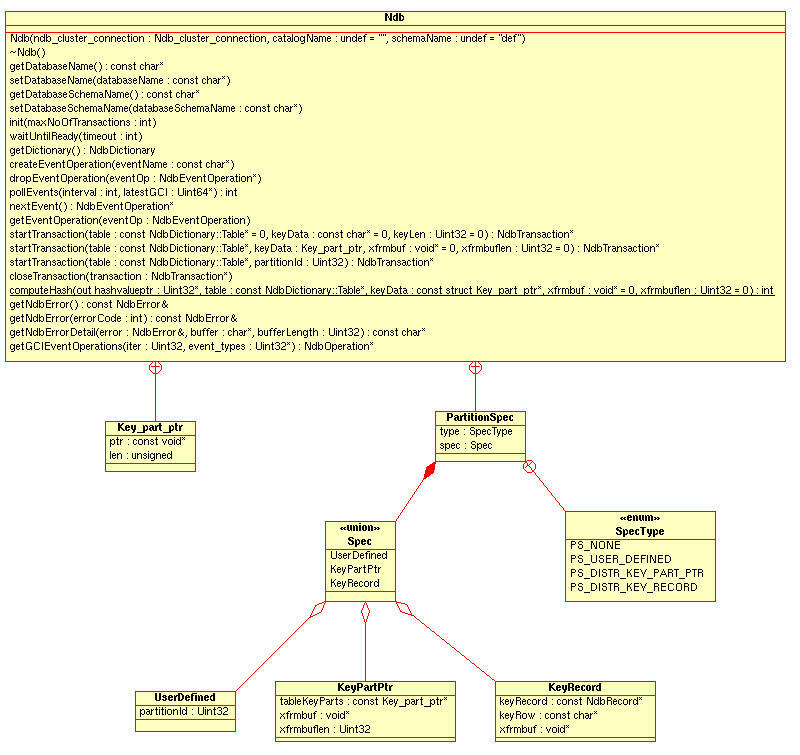- 2.3 NDB API Classes, Interfaces, and Structures
- 2.3.1 The Column Class
- 2.3.2 The Datafile Class
- 2.3.3 The Dictionary Class
- 2.3.4 The Event Class
- 2.3.5 The Index Class
- 2.3.6 The LogfileGroup Class
- 2.3.7 The List Class
- 2.3.8 The Ndb Class
- 2.3.9 The NdbBlob Class
- 2.3.10 The NdbDictionary Class
- 2.3.11 The NdbEventOperation Class
- 2.3.12 The NdbIndexOperation Class
- 2.3.13 The NdbIndexScanOperation Class
- 2.3.14 The NdbInterpretedCode Class
- 2.3.15 The NdbOperation Class
- 2.3.16 The NdbRecAttr Class
- 2.3.17 The NdbScanFilter Class
- 2.3.18 The NdbScanOperation Class
- 2.3.19 The NdbTransaction Class
- 2.3.20 The Object Class
- 2.3.21 The Table Class
- 2.3.22 The Tablespace Class
- 2.3.23 The Undofile Class
- 2.3.24 The Ndb_cluster_connection Class
- 2.3.25 The NdbRecord Interface
- 2.3.26 The AutoGrowSpecification Structure
- 2.3.27 The Element Structure
- 2.3.28 The GetValueSpec Structure
- 2.3.29 The IndexBound Structure
- 2.3.30 The Key_part_ptr Structure
- 2.3.31 The NdbError Structure
- 2.3.32 The OperationOptions Structure
- 2.3.33 The PartitionSpec Structure
- 2.3.34 The RecordSpecification Structure
- 2.3.35 The ScanOptions Structure
- 2.3.36 The SetValueSpec Structure
Abstract
This class represents the NDB kernel; it is the
primary class of the NDB API.
Parent class. None
Child classes. None
Description.
Any nontrivial NDB API program makes use of at least one instance
of Ndb. By using several Ndb
objects, it is possible to implement a multi-threaded application.
You should remember that one Ndb object cannot
be shared between threads; however, it is possible for a single
thread to use multiple Ndb objects. A single
application process can support a maximum of 128
Ndb objects.
Note
The Ndb object is multi-thread safe in that each
Ndb object can be handled by one thread at a
time. If an Ndb object is handed over to
another thread, then the application must ensure that a memory
barrier is used to ensure that the new thread sees all updates
performed by the previous thread.
Semaphores and mutexes are examples of easy ways to provide memory barriers without having to bother about the memory barrier concept.
It is also possible to use multiple Ndb objects
to perform operations on different clusters in a single application.
See the Note on
Application-Level Partitioning for conditions and
restrictions applying to such usage.
Methods. The following table lists the public methods of this class and the purpose or use of each method:
| Method | Purpose / Use |
|---|---|
Ndb() |
Class constructor; represents a connection to a MySQL Cluster. |
~Ndb() |
Class destructor; terminates a Cluster connection when it is no longer to be used |
init() |
Initialises an Ndb object and makes it ready for use. |
getDictionary() |
Gets a dictionary, which is used for working with database schema information. |
getDatabaseName() |
Gets the name of the current database. |
setDatabaseName() |
Sets the name of the current database. |
getDatabaseSchemaName() |
Gets the name of the current database schema. |
setDatabaseSchemaName() |
Sets the name of the current database schema. |
startTransaction() |
Begins a transaction. (See Section 2.3.19, “The NdbTransaction Class”.) |
closeTransaction() |
Closes a transaction. |
computeHash() |
Computes a distribution hash value. |
createEventOperation() |
Creates a subscription to a database event. (See
Section 2.3.11, “The NdbEventOperation Class”.) |
dropEventOperation() |
Drops a subscription to a database event. |
pollEvents() |
Waits for an event to occur. |
getNdbError() |
Retrieves an error. (See Section 2.3.31, “The NdbError Structure”.) |
getNdbErrorDetail() |
Retrieves extra error details. Added in MySQL Cluster NDB 6.2.19, MySQL Cluster NDB 6.3.29, and MySQL Cluster NDB 7.0.10. |
getReference() |
Retrieves a reference or identifier for the Ndb
object instance. |
For detailed descriptions, signatures, and examples of use for each
of these methods, see Section 2.3.8.1, “Ndb Methods”.
Class diagram.
This diagram shows all the available members of the
Ndb class:

